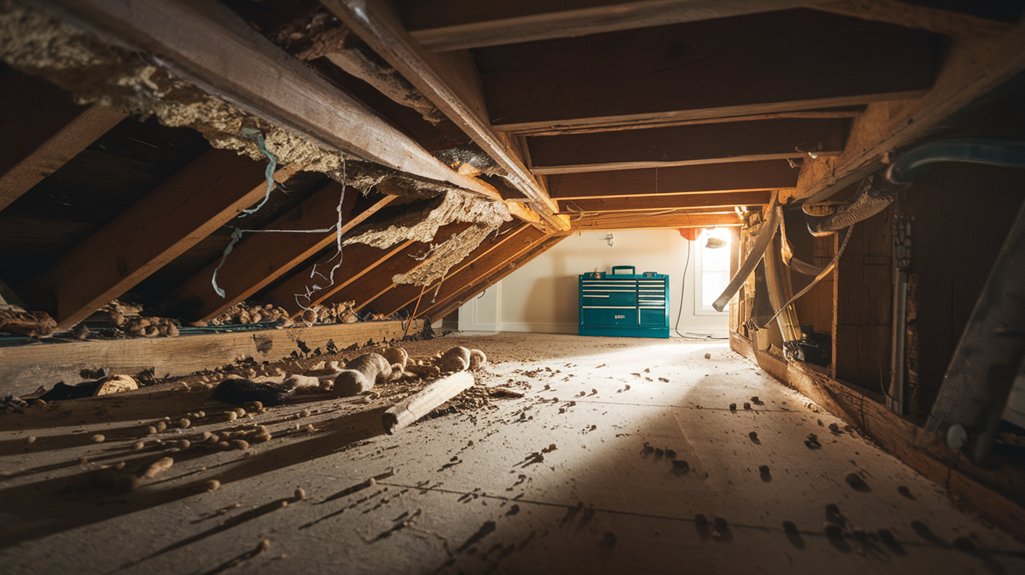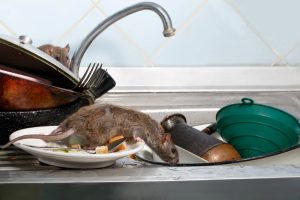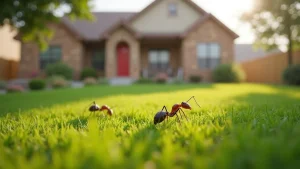Rodent infestations in Denver are on the rise, and it’s essential to take proactive steps to protect your home and business. With urban growth providing ample food and shelter, these pests can quickly become a problem. By understanding the signs of an infestation and implementing preventative measures, you can safeguard your space. What are the common types of rodents you might encounter, and how can you effectively keep them at bay?
Understanding the Rodent Problem in Denver

As you navigate the streets of Denver, you mightn’t realize the extent of the rodent problem lurking beneath the surface.
Urban rodent behavior is often driven by the availability of food and shelter, leading to increased encounters in your home or business. As the rodent population grows, they become more adept at finding ways to thrive in densely populated areas.
Their ability to reproduce quickly means that a small issue can escalate into a full-blown infestation if not addressed promptly. Understanding these behaviors is crucial for effective prevention.
Common Types of Rodents Found in Urban Areas
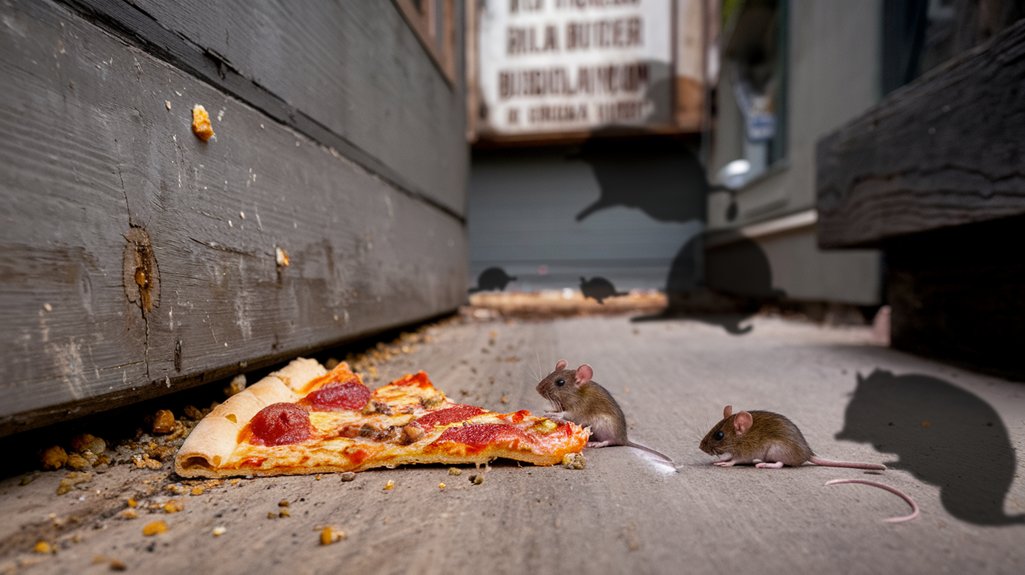
Urban environments like Denver are often home to several common rodent species that can wreak havoc if left unchecked. Knowing these species helps you take preventive measures.
Here are three common types you might encounter:
- House Mouse: This small mouse species is notorious for nesting in walls and cupboards. They’re fast breeders and can quickly multiply.
- Norway Rat: Known for their burrowing habits, their behavior includes gnawing on wires, which can be dangerous.
- Roof Rat: These agile climbers prefer high spaces and can invade attics. Their presence often indicates nearby food sources.
Understanding these species and their behaviors is crucial for protecting your home or business from potential infestations.
Denver Rodent Prevention protects your space. Learn pest tips from Colorado State University Extension.
Signs of a Rodent Infestation
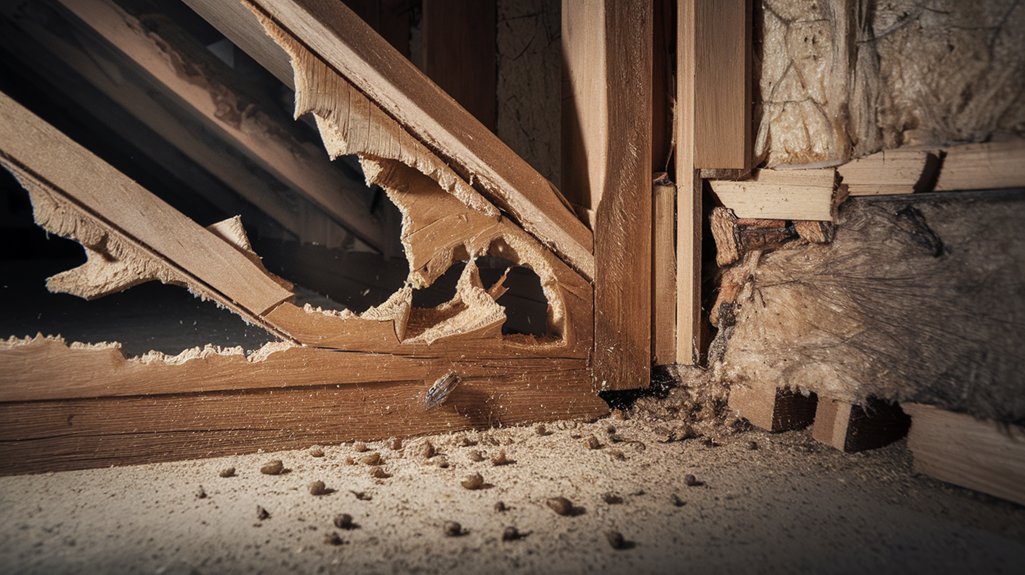
Rodent infestations can be a homeowner’s nightmare, but spotting the signs early can save you from significant damage.
One of the first signs to look for is droppings detection. If you notice small, dark pellets in your kitchen, pantry, or along walls, it’s time to take action.
Another key indicator is gnaw marks; check for damage on furniture, baseboards, and food packaging. Rodents have strong teeth and tend to leave behind distinct chew marks.
Additionally, listen for strange noises at night, like scratching or scurrying sounds.
Lastly, keep an eye out for nests made of shredded paper or fabric in hidden corners.
Recognizing these signs early helps you address the problem before it escalates.
Health Risks Associated With Rodents
Ignoring the signs of a rodent infestation can lead to more than just property damage; it can pose serious health risks to you and your family.
Rodents are known carriers of various diseases, and their presence in your home can result in significant health issues. Here are three key health risks associated with rodents:
- Disease transmission: Rodents can carry harmful pathogens, including hantavirus and leptospirosis, which may spread through droppings or urine.
- Allergic reactions: Rodent droppings and urine can trigger allergies, leading to respiratory issues and other health problems.
- Parasite infestations: Rodents often bring fleas, ticks, and mites, which can cause additional health concerns for you and your pets.
Taking action quickly is essential to protect your health and well-being.
Preventative Measures to Keep Rodents Away
Taking proactive steps can significantly reduce the likelihood of a rodent infestation in your home.
Start by sealing cracks and gaps around windows, doors, and foundations to eliminate entry points. Keep your kitchen clean and store food in airtight containers. Regularly dispose of garbage and avoid clutter, as it provides perfect hiding spots for rodents.
Consider using natural repellents like peppermint oil or cayenne pepper, which can deter rodents without harmful chemicals.
Habitat modification is also key; trim back shrubs and trees near your home to reduce nesting opportunities.
Effective Rodent Control Solutions
Even with preventative measures in place, rodent problems can still arise. To tackle these issues effectively, you need to choose the right solutions.
Here are some effective rodent control strategies:
- Trap Selection: Use snap traps for quick results or electronic traps for a more humane approach. Choose traps designed specifically for the type of rodent you’re dealing with.
- Bait Options: Select enticing bait, such as peanut butter or dried fruit, to lure rodents. Make sure to refresh the bait regularly for maximum effectiveness.
- Professional Help: If the infestation is severe, consider hiring pest control experts who can assess the situation and implement a comprehensive plan.
Maintaining a Rodent-Free Environment
To maintain a rodent-free environment, it’s essential to stay proactive in your approach. Start by implementing strong sanitation practices. Keep your kitchen and dining areas clean, and store food in airtight containers. Regularly dispose of garbage and clean up any spills immediately.
Additionally, consider landscaping tips to deter rodents. Trim back bushes and shrubs, and ensure there’s no dense vegetation near your home.
Here’s a simple table to guide you:
| Action | Description |
|---|---|
| Sanitation Practices | Keep areas clean, store food properly |
| Landscaping Tips | Trim plants, remove clutter |
| Seal Entry Points | Close gaps in walls and foundations |
| Regular Inspections | Check for signs of rodents frequently |
When to Call a Professional Exterminator
When should you consider calling a professional exterminator for rodent issues? If you notice any of the following signs needing immediate attention, it’s time to take action:
- Frequent Sightings: If you see rodents during the day, they may have established a nest nearby.
- Droppings and Urine: Finding rodent droppings or urine stains indicates an active infestation that requires professional intervention.
- Chewed Items: If you notice gnawed furniture, wires, or food packaging, it’s a clear sign that rodents are intruding.
Ignoring these signs can lead to bigger problems, including health risks and property damage.
Frequently Asked Questions
What Are the Best Natural Repellents for Rodents?
If you’re looking for natural repellents for rodents, try essential oils like peppermint or eucalyptus. Ultrasonic devices can also deter them effectively, creating a sound frequency that’s unpleasant for pests but inaudible to humans.
Can Pets Help Deter Rodent Infestations?
Yes, certain pet breeds, like terriers, can deter rodents with their natural hunting instincts. Observing animal behavior, you’ll notice how pets can create a less inviting environment for pests, helping to keep your space rodent-free.
How Often Should I Check for Signs of Rodents?
You should inspect your home regularly for signs of rodents, ideally once a month. Understanding rodent behavior helps you determine inspection frequency, ensuring you catch any potential infestations before they escalate into a bigger problem.
Are There Seasonal Trends for Rodent Activity in Denver?
Yes, there’re seasonal trends in rodent activity. As temperatures drop, rodents seek warmth indoors, increasing their presence. In spring and summer, they’re more active outside, driven by food availability and nesting behavior.
What Should I Do if I See a Dead Rodent?
If you see a dead rodent, wear gloves and carefully dispose of it in a sealed bag. Clean the area thoroughly to minimize health risks. Consider contacting pest control for further assistance and prevention.
To keep your home and business safe from rodent infestations in Denver, stay proactive by sealing gaps, maintaining cleanliness, and regularly checking for signs of unwanted guests. Implement effective traps, and if the problem persists, don’t hesitate to call in a professional exterminator. By taking these steps, you can protect your space and ensure a rodent-free environment. Remember, prevention is key, so start today to safeguard your home and business from these pesky invaders!
Contact Us
Denver Rodent Prevention with Above & Beyond Services protects your Denver home or business. Call (720) 806-6378 or visit Above & Beyond Services for free quotes on pest control, tree care, and more.
Key Takeaways
- Seal all cracks and gaps around windows, doors, and foundations to prevent rodent entry into your Denver home or business.
- Maintain rigorous sanitation practices by keeping kitchens clean and storing food in airtight containers to deter rodents.
- Regularly inspect for signs of rodent infestations, such as droppings, gnaw marks, and nests, to catch problems early.
- Choose effective trap options like snap traps or electronic traps, and use enticing bait like peanut butter to increase success.
- Consider hiring pest control professionals for severe infestations to ensure thorough and effective rodent management.

